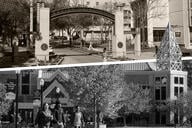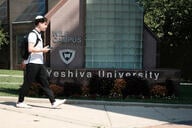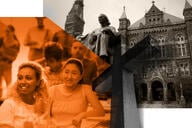You have /5 articles left.
Sign up for a free account or log in.
Historically, the evangelical colleges that comprise the Council for Christian Colleges and Universities have not been magnets for many black students. A new analysis from The Journal of Blacks in Higher Education suggests that’s changing, with some Protestant colleges recording staggering increases in black student enrollments over the last decade.
At Montreat College, in North Carolina, undergraduate black student enrollment increased from 3.7 percent in 1997 to 23 percent in 2007, according to the analysis. At Belhaven College, in Mississippi, black student enrollment climbed from 16.9 to 41 percent. At LeTourneau University, in Texas, the figure grew from 5.7 to 22 percent.
Overall, the analysis finds that the number of CCCU colleges where black enrollments are at 10 percent or higher has more than tripled to 29 over the last 10 years -- even as a core group of 22 Christian colleges maintain black enrollments of 2 percent or less (a decrease, however, from 33 such colleges in 1997).
The analysis is based on U.S. Department of Education data for 100 CCCU colleges. (CCCU has 110 member colleges in total. The journal’s managing editor said the publication included only colleges for which they had data in both 1997 and 2007.)
“The significance of the study is that many of these schools that had very few if any black students now welcome them and in many cases recruit them,” Robert Bruce Slater, managing editor of The Journal of Blacks in Higher Education, said via e-mail.
“Many of these colleges are very conservative and there was probably little outreach to the black community," Slater continued. "For black students interested in Christian colleges, there are a number of historically black colleges and universities that maintain affiliations with various churches. Black students may have felt far more welcome on these campuses than they would on the campus of a predominantly white Christian college.”
“I think now many of the Christian colleges see the value in diversity to the educational process. Also they know that in the real world their students will be dealing with an increasingly diverse society.”
'A Cumulative Process'
In interviews, Christian college administrators attribute the increases to conscious efforts to diversify their campuses, including through connections with black churches and through the establishment of new programs that disproportionately attract minority students.
“We have opened campuses in Memphis and in Orlando and in Houston. By doing that and by offering adult accelerated programs and graduate programs, I think that broadens our demographic,” said Roger Parrott, president of Belhaven College. He explained that the proportion of black students in the college's traditional undergraduate population in Jackson varies between 28 and 32 percent, with adult programs skewing the overall figure to the 41 percent mark.
“I would suggest that part of the trend you’re seeing among Christian colleges is their service to the adult population,” Parrott said. “A lot of our campuses go into cities and have a real commitment to serve the city and serve a diverse population.”
“At the same time, even in the traditional program, we’re very purposeful about it,” he said. “It’s an every day, every decision, every step we take kind of thing.”
In speaking of the challenges CCCU colleges face in attracting black students, Paul R. Corts, the association’s president, cited location (“some of our schools are more rural or more small town”) and the diversity, or, in some cases, lack thereof, of various denominations that colleges may be affiliated with or draw from. (Consider, for instance, Michigan's Calvin College, in the news over a conflict between diversity and identity earlier this year. It's tied to the Dutch-rooted Christian Reformed Church.)
Over the past decade or so, CCCU as an organization has placed an emphasis on enhancing diversity on its member campuses, through the creation, for instance, of a Commission for Advancing Intercultural Competencies and the sponsorship of related workshops. Since 2000, the association has offered an annual award for “advancing racial harmony.”
“Seeing that there are more black students enrolled is only part of the picture because one of the reasons you get more black students is because you’ve been making your campus more welcoming to blacks and other minorities as well,” Corts said.
"It was sort of a cumulative process," said David Turk, provost and vice president for academic affairs at Nyack College, where black student enrollment climbed from 13.3 percent in 1997 to 33 percent in 2007, according to the journal's analysis.
"We began a campus in New York City, in lower Manhattan, and almost immediately that campus was about 45 percent African American,” said Turk. Through the New York City campus, which grew to 1,300 students, Nyack developed relationships with African-American churches in Queens, and started attracting more black students to its traditional suburban campus.
Significantly, in the last 10 years, the proportion of full-time faculty who are non-white grew to 40 percent, Turk said, helping to create a comfortable setting for minority students. (By contrast, many other Christian colleges struggle with recruiting minority faculty, because of location and competition in hiring.)
“The other trend we’ve now seen is that African-American students no longer exclusively come from New York City. They come from all over the country now that they've heard about Nyack."
However, six-year graduation rates, as reported to the U.S. Department of Education, are higher for white than black students at both Belhaven and Nyack (38 versus 16 percent at Belhaven, and 51 versus 34 percent at Nyack). Administrators attribute the disparities to high minority enrollments at the city-based commuter or adult programs, with graduation rates, they said, being roughly consistent across racial lines within the traditional student body.
Other Christian colleges recording large increases in black enrollments from 1997 to 2007 include Warner Southern College, in Florida (from 12.2 to 21 percent), Eastern University, in Pennsylvania (from 9.7 to 17 percent), Palm Beach Atlantic University, in Florida (from 6.4 to 16 percent), Eastern Nazarene College, in Massachusetts (from 4.9 to 15 percent), and Indiana Wesleyan University (from 7 to 13 percent).
The journal’s analysis found that one CCCU college, Crichton College, in Tennessee, is majority black, at 53 percent.
On the other extreme, the nine colleges with black enrollment at 1 percent or less in 2007, according to the analysis, are Calvin, Northwest Christian, Northwestern and Dordt Colleges; Huntington, George Fox, Northwest Nazarene, and Colorado Christian Universities; and the College of the Ozarks.




